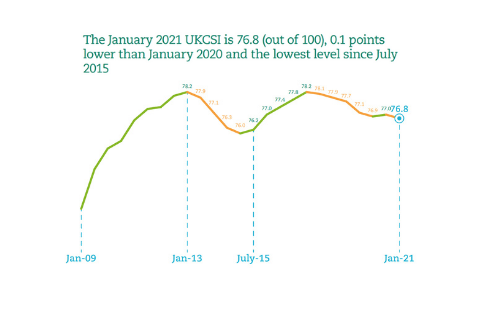There is no doubt we are navigating one of the most challenging periods in our living history. The events of the past year have shaken and changed the customer experience environment; perhaps forever, and the impact on the customer/organisation relationship is starting to become clear. The results of our latest UK Customer Satisfaction Index (UKCSI), published last week, revealed customer satisfaction in the UK continues to decline, falling to 76.8 – its lowest level since 2015.
Whilst on the surface the results appear similar to those reported in July last year, the past six months have seen a worrying rise in the number of customers experiencing problems with organisations – with issues ranging from the reliability and quality of goods and services to instances of late or slow service. Of course, some of these problems stem from the impact of the Covid-19 pandemic and our exit from the European Union on supply chains. Yet the problem is not new; we have seen a worrying downward decline in customer satisfaction in this country since long before the pandemic hit. As we continue to navigate a period of uncertainty and disruption, businesses must take these figures as a wake-up call to make service a boardroom priority.
The pandemic has exposed a hardening polarisation in our society. Lockdown has been a frustrating experience for us all, but whilst many have had access to technology, domestic space and a decent income, for many others the past year has seen a decline in financial, mental and physical wellbeing. As the gaps in our society grow ever wider, it’s more important than ever for brands to take the time to fully understand who they serve – and how they serve them.
We have seen a polarisation, too, in the way businesses have responded to shifting consumer needs. Many have displayed incredible agility to ensure they can continue to maintain services and react proactively to changing circumstances. Many too have sought to provide messages of reassurance, advice and support; maintaining regular, empathetic communication with customers when they needed it most. Others have struggled to meet the demands of a more complex trading environment; further adding to the disruption and anxiety experienced by their customers and employees.
The reality is, customer behaviours have changed; and in many cases these shifts are likely to stay around for the long-term. Customers of all ages and income groups are buying more online and thinking more carefully about where they spend their money. Many middle- or low-income customers have delayed big-ticket purchases whilst more affluent customers are giving greater consideration to ethical suppliers and the service experience. All are seeking to deal with organisations that ‘do the right thing’ and demonstrate that they care about the customer. If we are to recover from the economic impact of the past year, organisations must pay heed to falling customer satisfaction levels; taking the time to look at what we have learnt over the past year and using it to refocus their efforts for the battle ahead.
Organisations will need to be smart and agile in harnessing technology to enable fast, efficient transactional service and access to critical information and advice. However, whilst customers are increasingly comfortable using online channels, our research suggests some instances still require the empathy and reassurance of human contact. The key lies in offering channel by choice – providing customers with a range of options for how they want to interact with brands, based on their specific issue or need. The past year has also highlighted the rich potential for virtual technologies to enable innovative new ways of experiencing services and content. Increasingly, organisations will need to develop and excel in each of these areas to adapt to customer needs and create a sustainable future.
Customer service is a key enabler of business performance – and now more than ever, the service agenda is central to the future of our organisations and our economy. In an increasingly complex customer experience environment, a bad encounter makes the difference between a one-off transaction and a long-term, loyal customer. As the UK economy continues to feel the devastating impact of the coronavirus crisis, maintaining excellent service levels will be crucial to pulling the nation out of recession.



